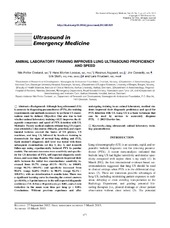Animal Laboratory Training Improves Lung Ultrasound Proficiency and Speed
Oveland, Nils Petter; Lossius, Hans Morten; Aagaard, Rasmus; Connolly, Jim; Sloth, Erik; Knudsen, Lars
Peer reviewed, Journal article
Published version
Permanent lenke
https://hdl.handle.net/1956/7873Utgivelsesdato
2013-09Metadata
Vis full innførselSamlinger
Originalversjon
https://doi.org/10.1016/j.jemermed.2013.03.029Sammendrag
Background: Although lung ultrasound (US) is accurate in diagnosing pneumothorax (PTX), the training requirements and methods necessary to perform US examinations must be defined. Objective: Our aim was to test whether animal laboratory training (ALT) improves the diagnostic competency and speed of PTX detection with US. Methods: Twenty medical students without lung US experience attended a 1-day course. Didactic, practical, and experimental lectures covered the basics of US physics, US machines, and lung US, followed by hands-on training to demonstrate the signs of normal lung sliding and PTX. Each student’s diagnostic skill level was tested with three subsequent examinations (at day 1, day 2, and 6-month follow-up) using experimentally induced PTX in porcine models. The outcome measures were sensitivity and specificity for US detection of PTX, self-reported diagnostic confidence, and scan time. Results: The students improved their skills between the initial two examinations: sensitivity increased from 81.7% (range 69.1% -90.1%) to 100.0% (range 94.3% -100.0%) and specificity increased from 90.0% (range 82.0%- 94.8%) to 98.9% (range 92.3%- 100.0%); with no deterioration 6 months later. There was a significant learning curve in choosing the correct answers (p = 0.018), a 1-point increase in the self-reported diagnostic confidence (7.8 8.8 on a 10-point scale; p < 0.05), and a 1-min reduction in the mean scan time per lung (p < 0.05). Conclusions: Without previous experience and after undergoing training in an animal laboratory, medical students improved their diagnostic proficiency and speed for PTX detection with US. Lung US is a basic technique that can be used by novices to accurately diagnose PTX.

